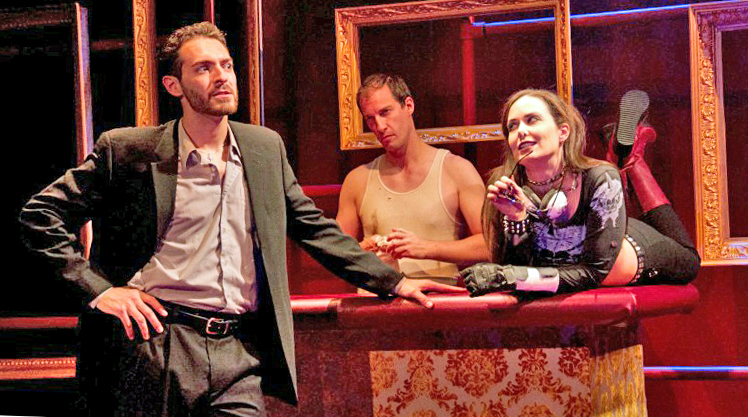
Delirium, an adaptation by Enda Walsh of The Brothers Karamazov by Fyodor Dostoyevsky. EgoPo Classic Theater in Philadelphia.
Dostoyevsky’s The Brothers Karamazov is great literature, but it resists adaptation into a stage drama. This was confirmed in a production by a company that specializes in expressing emotions through physicality. EgoPo has an excellent reputation for mounting transformative productions of classics, and director Brenna Geffers has proven her adeptness in this genre, but she’s thwarted by the script of Irish playwright Enda Walsh.
The great philosophical monologues of the novel here seem like awkward interjections. Whereas you can read the book at your own pace and mull over Dostoyevsky’s ideas, here you are jolted by quirky actions that divert your attention. The stylized choreography and fight scenes are arresting, but distracting.
In this version, the climax of Dostoyevsky’s story is omitted. We never see the arrest, interrogation and conviction of the eldest son for the murder of his father.
The fault is Walsh’s rather than the director’s. His script abandons Russian soul and presents characters who seem like members of a dysfunctional, present-day American (or Irish) family. Clearly, his intention was to make the play more relatable to our own lives. The result is almost as if Moss Hart and Alan Jay Lerner took Shaw’s Pygmalion and transplanted it to the USA as My Fair Family.
Most of the players speak contemporary American — and they use modern conveniences like cell phones. Fyodor Karamazov (the charismatic Robert Smythe) is a 55-year-old self-centered man who has sired three sons during two marriages. He also fathered an illegitimate son, Smerdyakov (Ross Beschler), whom he brought into his home to work anonymously as a butler and bartender.
The eldest son is Dmitri, commonly known as Mitya (Chris Anthony). He is a sensualist like his father but on a grander scale, spending large amounts of money on women and drugs. At the start of the play he has come to his father’s home to get money to repay his fiancee Katerina (Kelly McCaughan) whom he wants to dump because he’s infatuated with Grushenka (Kayla Anthony).
This adaptation fails to explain why Mitya needs to pay off Katerina as a requisite to break off their engagement. Let’s just assume that he perpetually needs money because of his expensive life-style. Mitya demands that his father hand over an inheritance that is owed him, but the old man denies him. In addition, Fyodor and Mitya are competing over the same woman, the exotic Grushenka.
Ivan Karamazov (Johnny Smith) is the middle son and first from Fyodor’s second marriage. He is an intellectual and an atheist, disturbed by the suffering in the world and quietly in love with his brother’s fiancee Katerina. This production portrays him as an ineffectual nerd.
Alyosha (Anthony Crosby) is the youngest son, a novice in a Russian Orthodox monastery and he represents a belief in faith.
Standouts in the cast are Smythe as the detestable father and Beschler as the resentful Smerdyakov. Beschler’s expressive second-act monologue is the emotional high point of the production.
Mime and puppetry (by Brian Jones) are used to portray past events, which is ironic because Smythe is the award-winning founder and artistic director of Mum Puppettheatre and has designed and directed puppetry worldwide.
Chris Anthony captures the desperation of Mitya but fails to awake sympathy for him. McCaughan gives an appealing, straightforward interpretation of Katerina while Kayla Anthony insufficiently suggests the sensuality of Grushenka. The younger brothers are sketchy, which may be attributable to inexperience or to the lines they’ve been given by Walsh — concluding with the unconvincing “We can walk the world with hope.”
This was co-produced by EgoPo and the Indiana University of Pennsylvania. It is the opening of EgoPo’s season of Russian plays, which will include Chekov’s Seagull, Gogol’s The Nose, and Anna, adapted from Tolstoy’s Anna Karenina.
Please share your thoughts with us. Address to editor@theculturalcritic.com
Read other reviews on The Cultural Critic